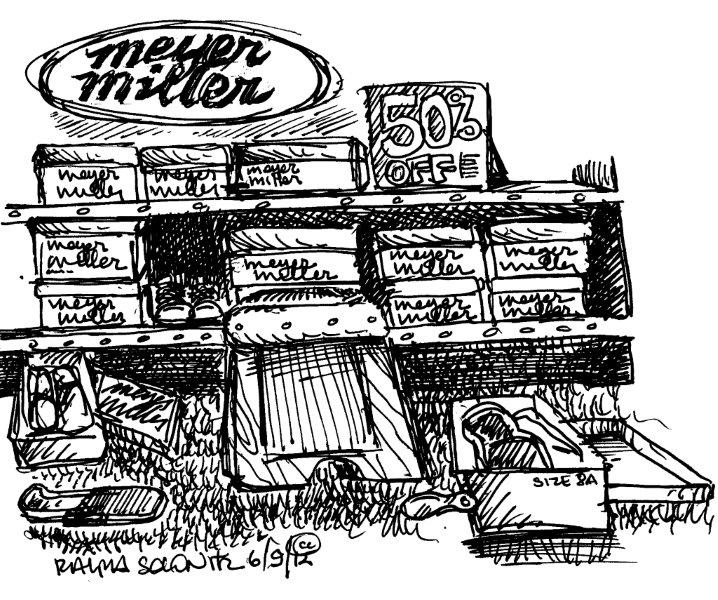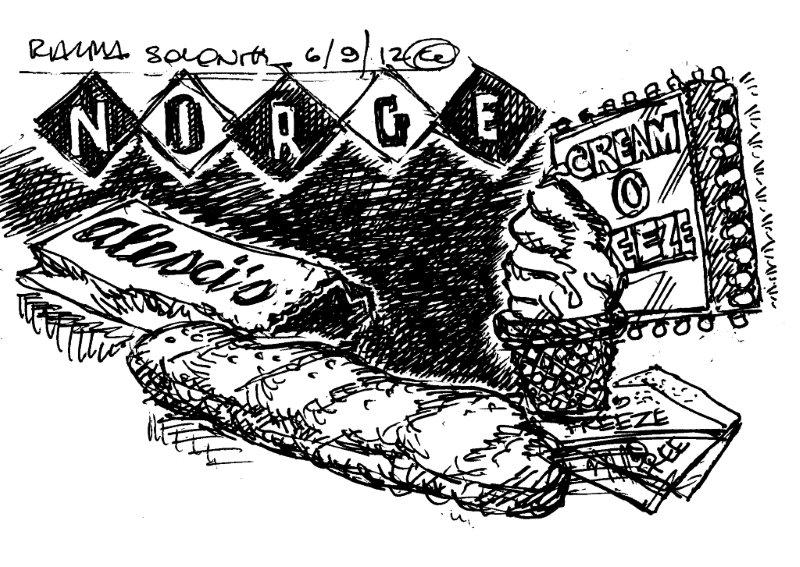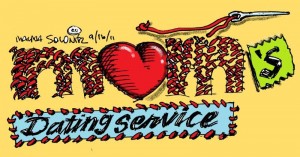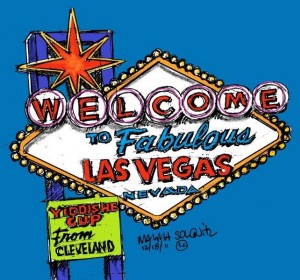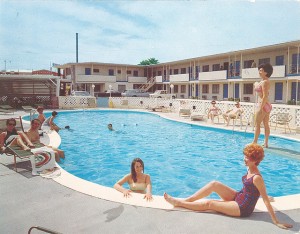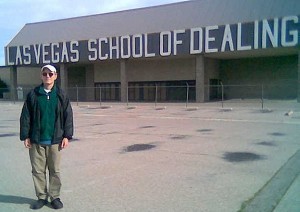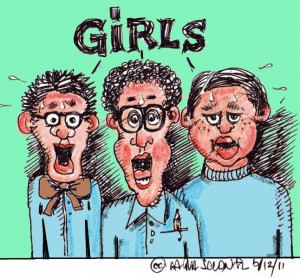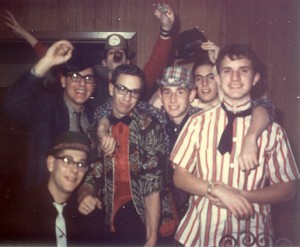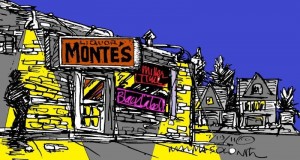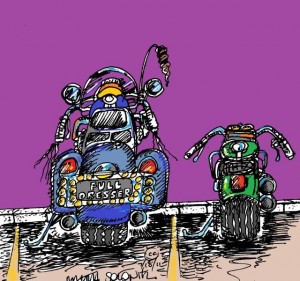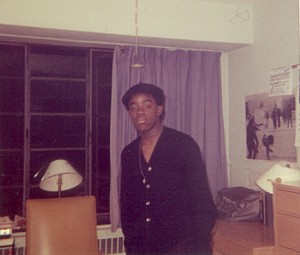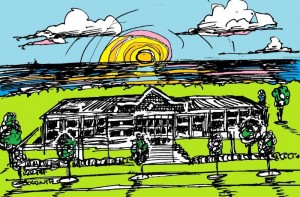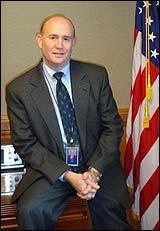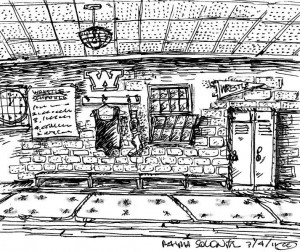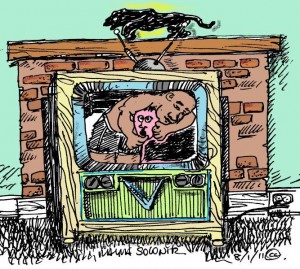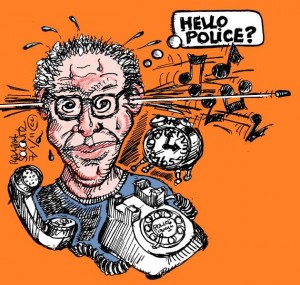Category — Coming of Age
FUNERAL REPPING
When my parents spent winters in Florida, I occasionally represented them at their friends’ funerals in Cleveland.
I didn’t like the work. My mother would call from Boca Raton and say, “Edith was such a good friends of ours. Please go, son.”
Screw Edith.
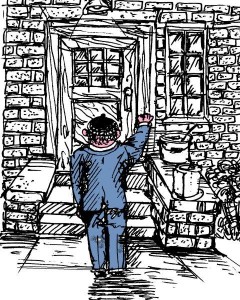 But I went. The hardest part was walking from my car to the shiva house. I pictured a bereaved relative opening the door and saying, “Who are you? Have you no decency? We don’t want any!”
But I went. The hardest part was walking from my car to the shiva house. I pictured a bereaved relative opening the door and saying, “Who are you? Have you no decency? We don’t want any!”
That never happened. I mingled with mourners. I was often the youngest non-relative there. Occasionally the rabbi would recognize me . . . “You have such a Stratton punim.” I looked like my mom or dad. Take your pick.
I eavesdropped. That was the action. An old woman said, “When I feel sick, I want to die. Then I get better and want to live.”
“Let me tell you something, deary,” another woman said. “They don’t ask when you want to die.”
My Cleveland Heights friends didn’t talk like that. They talked about marathons, 10Ks and Tommy’s milk shakes. A rabbi talked to me about the Cleveland Browns. Rabbis are into sports now, but a generation ago it wasn’t that common.
A food broker said, “I sell Heinen’s.”
Heinen’s didn’t interest me — not until at least fifteen years later.
I spent about twenty minutes per shiva call. The mourners were always appreciative.
My parents made me do it.
I’m glad.
—
Footnote:
While shiva repping, I met a California man who produced Joel Grey’s shows for 27 years. I said, “I’ll send you my band’s CD and you can show it to Joel. No, on second thought, I won’t send it, because Joel might sue me for ripping off Mickey Katz tunes.”
“Don’t worry,” the producer said. “Lebedeff’s people tried to hit Joel up for royalties on ‘Romania, Romania’ for years. No luck.”
—
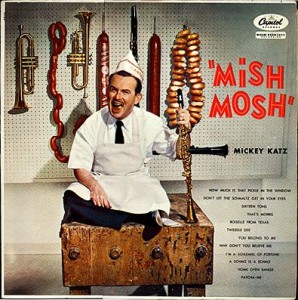 Yiddishe Cup plays 7 p.m. tomorrow (Thurs. Aug. 9) at Cain Park, Alma Theater, Cleveland Hts. We’re doing a tribute to Mickey Katz.
Yiddishe Cup plays 7 p.m. tomorrow (Thurs. Aug. 9) at Cain Park, Alma Theater, Cleveland Hts. We’re doing a tribute to Mickey Katz.
A documentary filmmaker from D.C. plans to be there. You might wind up in the movie.
Tickets are $20-22 in advance and $23-25 manana. Discounts for seniors and students. www.cainpark.com and 216-371-3000.
August 8, 2012 1 Comment
THE NOSTALGIA VORTEX
About half the people I meet in Cleveland are graduates of Shaker Heights or Cleveland Heights High. (I live in Cleveland Heights.)
The others are often out-of-towners. (“Out of towner” is anybody who moved to Cleveland within the last 30 years.)
I occasionally run into St. Ignatius and West Side grads too, but that’s not this story.
Cleveland Heights High grads like to reminisce about the Cedar-Lee neighborhood. Their nostalgia nexus is the Cedar Lee Theatre and what used to be around there . . . Mawby’s, Meyer Miller shoe store, Earth by April.
One Heights guy told me he learned almost everything in life by selling shoes at Meyer Miller as a teenager.
Meyer Miller’s co-owner was Cuppy Cohen.
The pool hall below the Cedar Lee Theatre was Wally’s.
Who cares? Heights people do.
Sid Abrams, a deceased freelance writer, wrote about Coney Island for the Cleveland Jewish News. He and the editor grew up near Coney Island. Two people read the Coney Island stories in the Cleveland Jewish News. Sid and the editor.
My nostalgia vortex is Mayfield Road, South Euclid. Mayfield Road was Italians plus a couple Jews, like me. My elementary school was on Mayfield, as was my high school, Brush. On my way home from elementary school, I would buy Italian bread at Alesci’s and hollow out the insides. My mother would say, “Where’s the bread?” as I handed her the crust.
West of Alesci’s was the Cream-O-Freeze; to the east, the Norge Village Laundromat. It took a village . . . Jay Drugstore, for baseball cards; Lawson’s, for Hostess cupcakes; Society for Savings, for uncirculated pennies.
Excuse me, I have to check the Sohio Jackpot winners list.
July 26, 2012 No Comments
YOU ARE THERE: 1973
“Forty years ago, the news media were filled with reports of a generation gap. Let’s be grateful that we’ve finally solved that problem.” — Karen Fingerman and Frank Furstenberg, op-ed, New York Times, 5/31/12.
Beachwood, Ohio, 1973
I live with my parents at the Mark IV, a high-rise apartment by the freeway.
I’m living with my parents at age 23! My life is so unexciting it couldn’t get published in a mortuary journal.
Chekhov said, “People do not go to the North Pole and fall off icebergs. They go to offices, quarrel with their wives and eat cabbage soup.”
I want to go to the North Pole.
My dad almost clobbered me because I didn’t want to save five dollars on traveler’s checks by comparison shopping at banks. “You aren’t a millionaire yet,” he said, scratching himself. He was wearing just underwear.
Tonight at a party — a parents’ party — Zoltan Rich, the Hungarian know-it-all, said, “The students protest for entirely selfish reasons. You know what the chief word is we’re missing — the key to the whole discussion? It’s obligation. Parents have abrogated their responsibility.”
It’s time to go.
A guy from Case Western Reserve said he might give me a ride out west tomorrow.
California or Mexico?
I won’t come back here for at least six months. My mother has a bridge game here tomorrow. If I’m within 100 feet of that game, I die.
Move along. Try the Rand McNally approach to self-discovery . . .
It’s 3 a.m. in Utah. I’m under a lamppost, “sleeping” in a sleeping bag. I hear deer. Or is it bears? I’m afraid of nature! I hear semis shifting.
I wonder if I like “freak” America. Deep down I’m straighter than a library science major. I could wind up back in Cleveland. You can go home again.
Or maybe I’ll settle out in California.
My dad says, “I’m sure you’ll be a success some day.”
At what? Whatever it is, I should do a good job of it. My father never says, “What are your plans? What do you see yourself doing in ten years?” That would be cruel.
***
My last month in Cleveland was a hell. But not a bad hell. My mother lined up dates for me. The dates were daughters of my mom’s friends. I took girls to bars and ordered 7&7s. That was my booze repertoire: 7&7s.
I got feedback about the dates from my mother through back channels. She picked up tidbits at bridge games. Some of the girls liked me, some didn’t. One girl thought I was “a little weird.”
She was weird. She had no business dragging me through her dad’s kangaroo court (his living room was plastered with World War II medals) for interrogation. What are my plans? What do I do?
What’s an apricot sour? That’s what I want to know. She ordered that.
I’m sitting on the dock of the bay in Bodega Bay, California. I’m eating squid. Or maybe it’s a big snail. I’m not sure. I’m at a marine lab. Wastin’ time? I don’t know yet.
—
Part of this post was on CoolCleveland.com, 10/12/11, called “Mom’s Dating Service.”
—
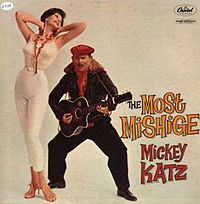 Yiddishe Cup plays a tribute to Mickey Katz 7 p.m. Thurs., Aug. 9, at Cain Park, Alma Theater, Cleveland Heights. For tickets: www.cainpark.com or 216-371-3000.
Yiddishe Cup plays a tribute to Mickey Katz 7 p.m. Thurs., Aug. 9, at Cain Park, Alma Theater, Cleveland Heights. For tickets: www.cainpark.com or 216-371-3000.
July 25, 2012 5 Comments
TENNIS, ANYONE?
I grew up in a gully, according to my friend Max Burstyn. Max said, “You lived on one of those dead-end streets that had flooding. You lived in a gully.”
Yes, there was some flooding, Max. I remember a canoe on my street.
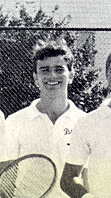
Max Burstyn, 1969
Max lived in the Jewish highlands on the other side of the public park. No flooding in the highlands there, and 99-percent yidlach. Max was equal to
1 ½ Jews. He spoke Yiddish and German. His dad was a Galitzianer from Krakow. Max was born in Munich and came to America as a baby in the 1950s.
I played tennis with Max in the park. That’s where we met.
Max still rants about the gully. He says, “You lived with the goys — like Stropki. I played Pony League with him. There were about eight Stropkis. What about Bobrowski? He was a Catholic too. Went to St. Joe’s. He played third-string for the Browns. He was from your street. There was Mastrobuono. He had a funny walk.”
True, I lived with Catholics, but I heard Jewish mothers shry gevalt (scream bloody murder) at their kids from across the park. Those Jewish moms had powerful lungs.
“Max, what about Willie Hendricks?” I said. “Why was he in your neighborhood?”
“Hendrick’s mother was Jewish,” Max said. “He could pitch.” Hendricks was about 6-4. He was drafted by the majors but never played pro ball.
Max was a self-described mischling ersten grades. (First-degree mixed race.) That’s a Nazi term, but Max used it — at least around me. Max’s mother was a German gentile and his dad was a Polish Jew. They met in Germany after the war. Max was halachically converted as a baby.
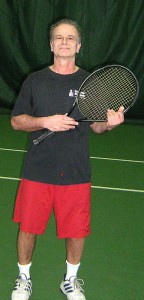
Max, 2012
Max comes to my house for shabbes. I like his Yiddish. He knows words that nobody else knows. He talks about a kudraychik — a swindler. I can’t find that in the dictionary. It’s probably Slavic, not Yiddish. For example, Max says, “There was a kudraychik, a Jewish barber, in the occupied zone after the
war . . .”
Max books rooms for a hotel chain. He works out of his house. He occasionally talks German to Europeans who want to book rooms in Florida and play golf. Max also gets calls from drunken Englishmen who call him “your majesty.” He has to work 92 percent of the time during business hours. He can watch baseball and football games on mute. “It’s not a bad job,” Max said. The occasional call from Germany, no boss and no commute. Not bad.
Max beat me at tennis. I hadn’t lost to him in a while. Did I sully the honor of the gully? I don’t think so. I’m not Catholic and I’m not gully-proud.
***
The tennis instructors at Bexley Park were mostly college kids who didn’t care about the job. One year it was Stovsky; the next year, Nagy, the state champ. These “pros” rarely showed us anything. Maybe they showed us grips: the Western, the Eastern, the Continental.
The courts were asphalt with cracks and weeds. At least the nets were real, not chain-link.
My dad got me about 10 private lessons at the Cleveland Skating Club in Shaker Heights. The pro there called me Tiger. I think he called most non-members Tiger. He was John Hendrix. He went on to coach at Ohio State.
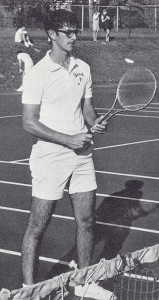
Shelly Gordon, 1969
Some of my Bexley Park tennis friends became jealous of me because of my private lessons. I got better than most of the Bexley players. One player, Shelly Gordon, still harps about my private lessons, like I violated the South Euclid Tennis Court Oath: Don’t Be a Tennis Snob. Shelly played at Ohio State and became a teaching pro in Israel. He’s self-taught. His strokes are horrible, but he’s good.
A seeming midget, Denny A., ruled Bexley Park, along with a gambler, Twitch, and a tomboy named Annie G. They bet on everything, like who could hit the most first serves in, who could bounce a ball the longest on his racquet. Bexley Park was not a genteel place. Some guys didn’t wear shirts. Billings –- the court gentile — played so much shirtless tennis he wound up with skin cancer.
Krinsky was the best hitter. He could have been a regional player, but he preferred baseball, softball and chasing girls. He was voted the “best dancer” in the senior class.
Max was third singles. Not that good, not that bad.
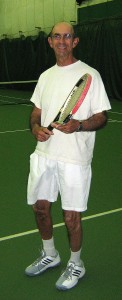
Shelly, 2012
Some of the best public court players were from neighboring Cleveland Heights. A couple Cleveland Heights boys took several private lessons at the Jewish country club, Oakwood. Garry Levy and Rich Greenberg became the number-one doubles team in Northeast Ohio.
The great public courts players of my day were:
Chuck McKinley, St. Louis
Billie Jean King, Long Beach, California
Pancho Gonzales, Los Angeles
Shelly Gordon, Cleveland
Shelly is remembered by all some in Cleveland, even though he moved to Israel years ago.
—
Yiddishe Cup plays 7:30 p.m. Thurs. (July 5) on the lawn at Wiley Middle School, 2181 Miramar Blvd., University Heights, Ohio. (Indoors if raining.) Free. It’s “Family Fun Night” with games and free ice cream one-half hour before the show.
July 3, 2012 2 Comments
THE NOSTALGIA VORTEX
About half the people I meet in Cleveland are graduates of Shaker Heights High School or Cleveland Heights High.
The others are often out-of-towners. (“Out of towner” is anybody who moved to Cleveland within the last 30 years.)
Cleveland Heights High grads like to reminisce about the Cedar-Lee neighborhood. Their nexus is the Cedar Lee Theatre and what used to be around there . . . Mawby’s, Meyer Miller shoe store, Earth by April.
One Heights guy told me he learned almost everything in life by selling shoes at Meyer Miller.
Meyer Miller’s co-owner was Cuppy Cohen.
The pool hall below the Cedar Lee Theatre was Wally’s.
Who cares? Heights people do.
Sid Abrams, the late freelance writer for the Cleveland Jewish News, wrote about Coney Island for many years. He and the Jewish News editor grew up in Coney Island. Two people in Cleveland read the Coney Island stories: Sid and the editor.
My nostalgia vortex is Mayfield Road, South Euclid. Mayfield Road was Italians and a couple Jews. My elementary school was on Mayfield, as was my high school. On my way home from elementary school, I would buy Italian bread at Alesci’s and hollow out the insides. My mother would say, “Where’s the bread?” as I handed her the crust.
West of Alesci’s was the Cream-O-Freeze; to the east, Norge Village Laundromat. It took a village . . . Jay Drugstore (for baseball cards), Lawson’s (for Hostess cupcakes), Society for Savings (for uncirculated pennies).
Excuse me, I have to check the Sohio Jackpot winners list.
June 11, 2012 No Comments
THE SMARTEST WOMAN EVER
Ann Wightman got all As and one B in high school. I think she purposefully got the B to let a boy be valedictorian. That’s how it worked back then; some smart girls didn’t want to stick out academically.
In 1991, my wife, Alice, called me from the Okefenokee Swamp, Georgia. She was on a canoe trip. She said, “You’re not going to believe who I’m with.”

Ann Wightman
“Ann Wightman?” I said.
“Yes!”
I often guessed “Ann Wightman.” I had a case of Ann-on-the-brain, even though I hadn’t seen her in 23 years — since high school graduation.
When my kids were very young, I told them: “There was this girl, Ann, in my second-grade class who read so many books, the teacher had to put up extra sheets of paper on the wall to track her book reports.”
I probably ran into Ann after graduation, but didn’t recognize her. Maybe we were at Disney World or O’Hare airport together. I’ve seen everybody at least twice. That’s my theory.
The Georgia sighting: Ann was in an alligator-infested swamp with my wife. Alice, via the park pay phone, said, “Ann says your crowd at Brush High was so full of itself — particularly after they went up to Boston and saw Harvard their senior year — that they clapped when Larry Klein was named valedictorian instead of her. That bothered her.”
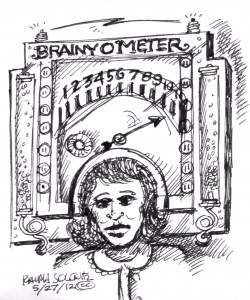 I could see why. Klein was smart, but not as smart as Wightman.
I could see why. Klein was smart, but not as smart as Wightman.
I met Ann at the swamp when I picked up Alice. (I had been at my cousins’ in Jacksonville.)
Ann was blasè. She didn’t want to reminisce with me about high school. She said, “I’ve probably mentioned high school twice to my husband.”
Ann, what about about our Spanish teacher, Mrs. Worth? I knew Ann was a professor of Latin American history at Wesleyan University. Ann wasn’t interested in recordando a Mrs. Worth.
Was high school that bad, Ann?
I haven’t seen Ann since. And she’s not coming to any high school reunions.
It’s over.
—
Three days left to Jack Stratton’s Kickstarter campaign. Something about synth and banjo. He needs a couple more backers. Check it out and contribute here.
May 30, 2012 5 Comments
MY FORMER IDENTITY
When I got rid of my LP record abums, my friend Carl said, “How can you do that?”
The LPs were heavy, for one thing. And I hadn’t listened to them in 20 years. “Carl, in 10 years I might not be able to physically pitch them, ” I said. “I’ll be pointing at each one from my La-Z-Boy and making my kids choose between Bob Dylan and Charlie Parker. So I’m doing it now for my kids’ sake.”
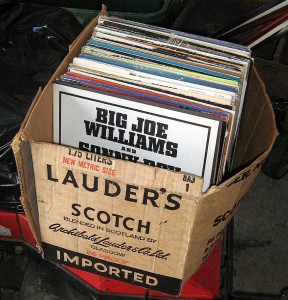
I could have put my records on the treelawn (Cleveland-
speak for the grass strip by the curb). I could have taken the LPs to a record store. Or a record store could come to me.
A record store came to me. Pete the Record Guy showed up at my house.
 Just prior to Pete, Carl took five LPs for a wall montage. He liked Coltrane Plays the Blues, Volunteers by Jefferson Airplane, and Archie Shlepp’s Four for Trane — all good cover art. Carl, a roots-music maven, said I was in the top 5 percent of respectable record collections.
Just prior to Pete, Carl took five LPs for a wall montage. He liked Coltrane Plays the Blues, Volunteers by Jefferson Airplane, and Archie Shlepp’s Four for Trane — all good cover art. Carl, a roots-music maven, said I was in the top 5 percent of respectable record collections.
My record collection was my former identity. It was my Facebook persona, circa 1975.
I found a receipt in a Stuff Smith Black Violin album — $1.50 from Mole’s. Where was Mole’s? I don’t remember. [It was on Coventry Road in Cleveland Heights.]

Harvey Pekar
Harvey Pekar used to rifle through my albums. The only album he ever wanted was my Charlie Parker Memorial Album, Vogue Records, England, 1956. I didn’t sell it to Harvey. I figured, If Pekar wants the record that badly, it must be worth something.
I checked on the Charlie Parker Memorial on the Internet. Today it’s worth £5.40 to an Englishman on eBay. That’s about $9. Nothing. Pekar was always into small numbers.
My kids didn’t want my albums.
I wanted to play Lenny Bruce’s “Lima, Ohio” bit (from The Best of Lenny Bruce) for Carl, but I didn’t have a record player handy. Carl said, “It’s probably on YouTube.”
Right. That’s why I got rid of my records.
Pete the Record Guy went through my albums three times. Adiós Aretha Live at the Fillmore West, John Handy’s Carnival, Paul Butterfield . . .
Let it go.
Three-hundred dollars from Pete for 100 records. Not bad. Pete didn’t care about the condition of the records. Pete said young kids –- his main customers — “won’t buy the reissue LPs, they want the originals, like yours.”
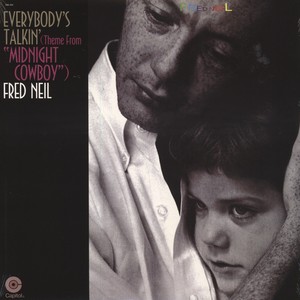 I said, “What jumped out at you? Is there any album worth 90 percent of what you paid me?”
I said, “What jumped out at you? Is there any album worth 90 percent of what you paid me?”
He said, “I like your two Fred Neil’s, Everybody’s Talkin’ and Sessions. You don’t see those often.”
“Let me take a photo. Don’t worry, Pete, I’m not taking the records back.”
—-
SIDE B
(This flip side is a little something extra for readers arriving on the A train from New York Times Square. Northerners, let’s trash the Sun Belt . . .)
ATLANTA: NOT SO HOT
Atlanta is not far enough south for some Atlantans. Right next to the Atlanta airport is a billboard “Beach Bummed?” Meaning, go to Florida.
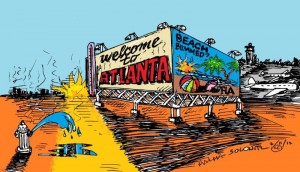
Atlanta isn’t very good for sunbathing unless you want to tan your left elbow in traffic for several hours.
I was at Atlanta airport, going through nine time zones to get to my gate. The TSA clerk, glancing at my ticket, said, “So you’re going back to beautiful Cleveland?”
Yes, sir, and it’s a lot better than Atlanta. (I didn’t say anything.) Cleveland is not Paris — or Pittsburgh, for that matter — but it’s a step up from a Southern-sprawl traffic crawl.
I’m going to Atlanta this month for a family bat mitzvah, and I have a summer gig there with Yiddishe Cup. I’ve been to the Coke Museum twice. Is there a rum-and-Coke museum in Atlanta? If so, where?
—
Atlanta relatives, nothing personal!
—
My best writing is “The Landlord’s Tale” in the latest City Journal. Please check it out. Must read long amusing essay about real estate now!
March 7, 2012 9 Comments
BEST SHOW IN VEGAS
I was back from Las Vegas, attending a Shaker Heights brunch. Several people asked, “Did you play?”
Did Yiddishe Cup play Vegas?
I wish Yiddishe Cup had played Vegas.
I had been in Las Vegas on vacation with my wife, Alice, and older son, Teddy. I had played blackjack.
That was my second trip to Vegas. My first trip was in 1962, when a Vegas waitress predicted I (then-12 years old) would return to Nevada for my honeymoon. That waitress was very wrong.
I prefer outdoorsy vacations.
On my latest trip I won $7.50 at blackjack at the Jokers Wild, then quit. I could hardly breathe in the Jokers Wild –- or in any other Nevada casino — because of the cigarette smoke. I hung around the casino parking lot, waiting for Teddy and Alice to finish up.
My favorite Las Vegas attraction is the Red Rock Canyon, which is similar to Zion National Park, but only 17 miles from Vegas.
The Red Rock performs daily in an original revue that is F’n Crazy! Be a Part of It! Best Show in Vegas for the Past 900 Years!
***
December 28, 2011 5 Comments
NO GIRLS ALLOWED: KEEP OUT!
The Intakes, a JCC boys’ club, should have met at the old Council Educational Alliance on Kinsman Road. The Intakes was a throwback to a Depression-era settlement-house boys’ club.
The purpose of the Intakes was to keep teenage boys off the streets, which wasn’t too hard because we studied so hard we rarely went out.
The club president had a regular Saturday night excuse: “I’ve got too much homework. I can’t go out.” On Saturday night? One summer the club president landed a grant to write a report on the crystal structure of molecules.
The Intakes Club didn’t “intake” girls. We were for the most part afraid of girls. We played poker, miniature golf, bowled and held meetings.
Our advisor was a social worker from New York. He often called us “schmucks,” which we found endearing.
We debated where to spend our money, which we earned by selling salamis and Passover macaroons.
Should we go to New York or Washington?
We went to both, on the Hound. (Two different trips.)
In New York we went to the Statue of Liberty, saw Jeopardy! live and ate at Katz’s Deli. I bought Existentialism Versus Marxism in a Village bookstore. I haven’t finished it yet.
In Washington we met our congressman and pantsed an Intake back at the hotel. We tried to post his pics on the ’net, but got an error message: Internet not invented yet.
Our congressman, Charles Vanik, had an administrative aide, Mark Talisman, a small smart Jew who was just eight years older than us. He seemed to know everything about the government. He gave us a private meeting. He was the puppet master for the entire suburban east side of Cleveland.
Talisman was an inspiration. He made it out of the tough Harvard-Lee neighborhood to Harvard U.
We should have made Mark Talisman an honorary Intake.
We shouldn’t have taken those naked pictures.
November 30, 2011 6 Comments
MOM’S DATING SERVICE
I lived in Beachwood at the Mark IV apartments (now the Hamptons) after college. I was staying at my parents’ apartment.
My dad said, “I’m sure you’ll be a success some day.”
At what? Whatever it was, I should do a good job of it. My father never said, “What are your plans? What do you see yourself doing in ten years?” That would have been cruel.
My post-college days were hell, but not a bad hell. My mother lined up blind dates for me. The dates were usually daughters of my mom’s friends. I took the girls to bars and restaurants and ordered 7&7s. That was my total booze repertoire: 7&7.
I got feedback about the dates from my mother, who picked up tidbits through back channels, like at bridge games. Some of the girls liked me, some didn’t. One date thought I was “a little weird.”
She was weird. She had no business dragging me to her dad’s kangaroo court (his living room was plastered with World War II medals) for interrogation. What were my plans? What did I do?
What’s an apricot sour? That’s what she had ordered at the bar.
Meanwhile, my old-neighborhood pal Frankie (not his real name) wanted to go to a Corvette rally, starting at Manner’s Big Boy, Mayfield Heights. Frankie had a brand-new 1974 ’Vette, 350 HP, headers, with all the emission controls removed.
No thanks, Frankie.
Frank said, “You think you’re too good for my ’Vette! You’d prefer a VW bus with a hippie slut. Hey, why not try real chicks and real cars. Friday night at the Strongsville Holiday Inn, it’s crawling with it. Chicks and ’Vettes.”
“I’ll pass.”
“You’d rather be in Cleveland Heights! Any city that has a bumper sticker like that is a losing proposition.”
After my six-month sentence at the Mark IV, I moved to Cleveland Heights, into a double, which I shared with Case Western Reserve graduate students.
Cleveland Heights worked. I’ve been there ever since.
I haven’t seen Frank in more than 20 years. He doesn’t hang around klezmer concerts, for one thing.
My future wife, Alice, knocked on the door of the Cleveland Heights double, looking for a room to rent.
Mom’s Dating Service became history right then.
October 27, 2011 No Comments
THE BILLYS
My parents often name-dropped Billys, who I usually didn’t recognize.
The Billys were:
1.) Billy Rose. He put together the Aquacade show at the Great Lakes Exposition in 1936-7. The Aquacade was a theater-like pool. There was an orchestra and synchronized swimming. Johnny Weissmuller starred in it. Billy Rose took the show to the New York World’s Fair in 1939.
2.) Billy DeWolfe. A character actor. Billy De Wolfe occasionally ate at my Great Uncle Itchy’s restaurant, Seiger’s, on Kinsman Road. Was Billy De Wolfe really Billy D. Wolf, Billy The Wolf, or what?
3.) Billy Weinberger, a Short Vincent Street restaurateur (Kornman’s) who moved to Las Vegas in 1966 and took over Caesar’s Palace. My Uncle Al got discount hotel rates “from Billy” in Vegas. Billy was close with the Cleveland mobsters who started Vegas.
***
Did I ever name-drop Billys to my kids? I don’t think so. I can’t think of any Billys. My parents took all the Billys.
I did Garys: Gary Moore, Gary Powers and Gary Lewis.
—
Bonus: Whatever Happened to Putt Putt?, an original video:
October 19, 2011 5 Comments
ALMOST BLACK LIKE ME
At Monte’s bar in South Euclid, there was a lot of talk about blacks, but no blacks.
For instance, a Harley Electra Glide was a “nigger-lighted” Harley. The Harley Electra Glide was the black man’s bike because it had after-market trim lights. The white man’s bike was the Harley Sportster, the chopper.
“Nigger fishing” meant casting from the power-plant pier instead of from a boat. Sheepshead was a “nigger fish,” usually caught from the pier. Lake Erie perch was a high-end fish, often requiring a boat to catch.
Monte’s bar also featured Italian specials like tizzone (“coal”) and mulunyan (“eggplant”).
I went to Monte’s to see my neighborhood friend Frank, a mutuel clerk at the racetrack. He wore a snub-nosed .38 in a shoulder harness and always had a wad of cash. Frankie didn’t like dirty money. “I can’t stand it when people give me dirty bills,” he said.
Frank’s mother had played banjo in an all-women’s band, and his father had idolized trumpeter Harry James.
Frank played trumpet in a white soul band. He kidded me because I dabbled in a “nigger band” — a band with blacks.
I was interested in soul jazz (Hank Crawford, Wes Montgomery), which I had heard at my college dorm. I had lived across the hall from three Detroit black kids who were from inside 8 Mile — way inside. Two were dopers into scag (heroin), grass and cocaine. They railed at me for being so straight and suburban. I bothered them. They would say: “Bert, you be a trippin’ motherfucker . . . You’re a bitch with your shit . . . That motherfucker be trippin’ . . . ”
They kidded me because they loved me . . . “Stop playing that country shit!” (I played blues harmonica along to Brownie McGhee and Sonny Terry tapes.)
When money was low, the dopers would go to the parking garage across from the dorm and sniff gas from cars for a high. That was called “hitting the tank.”
The third black kid was a non-doper. He was middle-class, an “elite.” He moved to another floor and became a doctor.
At Monte’s bar, patrons liked the idea of blacks and black slang. I was the maven on the subject. Frankie suggested I go to the ghetto and talk shit.
Great idea. I went to Hough and walked past an angry black man (not too hard to find in the early 1970s) and said, “What’s happnin’, man?”
“Nothin’ to it,” the man said, not breaking stride.
I was hip. He was hip.
I stayed hip for another two years, until I took an ulpan (Hebrew course) at Case Western Reserve Hillel.
—-
“Monte’s bar” is a made-up name. “Frank” is also a pseudonym.
—
More on Frankie at today’s CoolCleveland.com. See “Mom’s Dating Service.”
—
World-class shofar playing from Cleveland . . .
More on this guy — and his Kickstarter project — here.
October 12, 2011 8 Comments
MY PERSONAL G-MAN
The FBI building in Cleveland on Lakeside Avenue is on a bluff overlooking Lake Erie. The building is outside the downtown district by a few blocks and somewhat secluded.
I went there to see the head man.
To get to him, I went through two minutes of various security checks in the lobby. Then I was in the boss’ office, overlooking the lake. Nice. If the sun had been out, it would have been Santa Monica.
The boss, Gary Klein, and I were old friends from high school. Gary had been a fearless JCC-league basketball player. After high school, Gary went off to Annapolis, where he got his nose broken by a Southerner in a boxing match. Gary told me some of the students had razzed him because he was Jewish. It didn’t faze him.
Gary was tough, but not greaser tough. He was smart and bowlegged like a cowboy.
Gary showed me the FBI’s war room and the bug-proof room. He said FBI life looked glamorous but wasn’t. In 19 years he had lived in Boston, New York (Cosa Nostra and Russian mob work), Phoenix, Houston, Washington and Cleveland.
His new job was snooping on potential terrorists in northern Ohio, from Cleveland to Toledo. He said, “Ninety-nine percent of it is B.S. leads, like somebody dumping burial ashes over Parma Heights.”
Fighting terror was job one, forget about The Mob, he said.
Gary, how can we forget The Mob? They’re a lot more fun than Islamic terrorists! We grew up on The Mob. Hollywood wouldn’t exist without Mob movies. I had been inside the Little Italy house of James Licavoli (aka Jack White), the last head of the Cleveland Mob. Licavoli made wine in his cellar. Drinks all around.
Gary asked me to keep my eyes open.
I said I would. (This was 2003.)
So far nothing but B.S. leads, thank God.
September 7, 2011 3 Comments
SMALL TOUGH JEWS
The small tough Jews in my high school were wrestlers, except for the one who was a gymnast.
I saw the gymnast — and his wife — years later at a Yiddishe Cup concert. I said to the wife, “Your husband was a star!” She didn’t seem to know that.
The great Reed Klein. He went on to the Ohio State gymnastics team. Reed was the only gymnast in our high school. There was no team. Reed was an iron man and one small tough Jew. Five-foot-five, max.
The other small tough Jews were Harry Kramer and Steve Gold. They wrestled in very low weight classes, like 93 pounds and 103 pounds in junior high.
Small Jewish wrestlers — as a classification — are still with us. The Cleveland Jewish News ran an article titled “Gross, Jacober, Harris place in state mat meet.” The boys are Beachwood High’s 112-, 130- and 125-pound wrestlers.
My son Jack wrestled in middle school. The matches were so primal: two or three minutes of animal behavior in a stinky windowless wrestling room. Tough and scary. And I was just watching.
My wife dated a wrestler in high school.
Maybe I should have wrestled.
It never entered my mind. I don’t like singlets. I don’t like armpits – other guys’. I don’t like headlocks, unless Bobo Brazil is giving one to Lord Layton, and it’s 1960.
——-
The yideo below, “Stratton of Judea,” is from the Klezmer Guy live show. The clip is about my father changing his last name. One of my better efforts.
The text — but not the video — was posted here Sept. 16, 2009.
—–
Yiddishe Cup plays 7 p.m. Thurs., Aug 25, at Wiley Middle School, 2181 Miramar Blvd., University Heights, Ohio. The concert is in the air-conditioned auditorium rather than on the lawn, due to construction outside the building. Free. More info at 216-932-7800.
August 17, 2011 6 Comments
MUSIC! CALL THE COPS
Constantin Ferrito, a neighbor, was an usher at the Stadium. Good for him. Not good for us — the neighborhood kids. Mr. Ferritto didn’t allow kids to sneak into the box seats, even though Cleveland Municipal Stadium was usually three-quarters empty.
Mr. Ferritto’s wife was also hard on us. Specifically, she was very sensitive to noise — except her son’s. Her son, John, played piano a lot. He would not shut up on piano.
I practiced an hour a day on clarinet; John Ferritto was just getting warmed up at an hour.
Another neighbor, Frankie, practiced a half hour on trumpet and a half hour on piano. His father kept a clock on him. Frank’s sister punched the clock for a half hour on piano and a half hour on accordion.
John Ferritto ultimately attended the Cleveland Institute of Music and Yale, and became a conductor.
Right now –- a million decades later –- a neighbor is playing drums a block from me. I might call the cops on him. I’m sick of hearing his drums. He plays in his garage, and the sound reverberates. He plays all year round, even during school hours; he must be an adult.
Should I call the cops?
Nobody called the cops on John Ferritto. Nobody called the cops on me.
Somebody did call the cops on Yiddishe Cup. We were playing a bar mitzvah party in a backyard in Shaker Heights. No music allowed in Shaker after 10 p.m.
I can’t call the cops.
My best option: Go nuts.
—
Footnote: “Frank” is a pseudonym.
—-
Here’s an original yideo, “Is Dave Brubeck Jewish?”
August 3, 2011 5 Comments
WHERE DID YOU GO TO
HIGH SCHOOL?
When Mel, the bride’s father, inquired about Yiddishe Cup’s fees, he said his grandmother had baby-sat Joel Grey (Mickey Katz’s son). Mel asked if Yiddishe Cup knew any Mickey Katz tunes.
I said, “We play more Mickey Katz songs than anybody in the world! You’ve heard us, right?”
No, he hadn’t.
I said, “Have you been under a rock for twenty-one years?”
Mel was from Cleveland. Where had he been hiding? Mel said he didn’t get around much. He used to get around. He said, “Where did you go to high school?”
“Brush,” I said.
Mel graduated from nearby Cleveland Heights High — a rival — but, nevertheless, he was OK with Brush High. He had played softball with Brush boys in a JCC league. Mel was six years old than me; I didn’t know any of his Brush buddies.
Mel’s daughter — the bride — was 31 and living in Brooklyn — Yiddishe Cup’s target demographic. I said, “Has your daughter checked out Yiddishe Cup’s Web site? It doesn’t matter if you like Mickey Katz. She’s calling the shots. ”
“Do you know Joel Schackne?” Mel said. (Schackne had been a champion tennis player at Heights High.)
“I know of him. Whose idea is the Jewish music?”
“Schackne is in Florida. He’s still playing tennis.”
“What does your daughter think about Jewish music?”
“What AZA were you in?” (AZA: a B’nai B’rith boys’ club.)
“I was in a JCC club.”
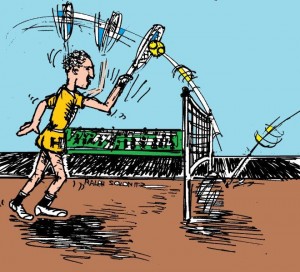
The Great Schackne
A week later, I met Bob, a cleaning supply man, and also a Heights High grad. I met him at an AIPAC meeting. Bob was not OK with Brush. He said, “Brush was a bunch of greasers and Italians!”
The AIPAC speaker, a Brush grad by the way, had left Cleveland years ago to attain multiple Ivy League degrees and become a weapons analyst with the government, maybe the CIA. He was an old friend of mine. I wanted to talk Iranian nuclear capabilities with him. The inside story. He didn’t.
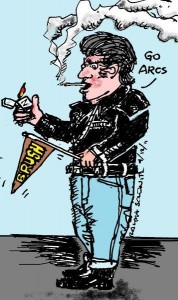 Ron, a Brush graduate living in Connecticut, phoned to say he was in Cleveland at a nursing home, visiting his dying mother. Ron asked if anybody was still in town. (“Anybody” meant “Our Crowd.”)
Ron, a Brush graduate living in Connecticut, phoned to say he was in Cleveland at a nursing home, visiting his dying mother. Ron asked if anybody was still in town. (“Anybody” meant “Our Crowd.”)
I said, “Nobody is here.” Most of our gang had left. The Jewish guys still in town were, for the most part, entrepreneurs and family-business owners. A couple local guys had even made serious money. One, who built cell phone towers, was a playboy with femme fatales poolside.
Howard, a Brush grad in New York, called. He was coming through Cleveland. His parents were moving to assisted living. He said we should get together.
Did I have a post–high school life?
I think so. I’m not stuck on high school. But the subject does come up. I live in my hometown. What can I say?
Go Arcs.
—-
1. Mel didn’t hire Yiddishe Cup for his daughter’s wedding.
2. The Arcs is the nickname of Charles F. Brush High School. Brush, a Cleveland inventor, developed the arc light, which illuminated streets prior to the incandescent bulb.
—-
A version of this post appeared in the Heights Observer online on April 26, 2011.
June 29, 2011 3 Comments
TESTING ONE, TWO . . . CARBURETOR
When I was home for college vacation, my mother suggested I go to the West Side with my father. (“West Side” meant the apartment biz.)
My mother never went to the West Side. She didn’t go once! I listened to my dad talk about boiler additives and sump pumps. My dad carried an Allen wrench to adjust boiler controls.
I nearly died on the West Side. I had seen Roland Kirk at the Eastown Motor Hotel, East Cleveland; Sonny Stitt at Baker’s Keyboard Lounge, Detroit; Ben Webster at Ronnie Scott’s Club, London. And now I was on the West Side talking about radiator vents.
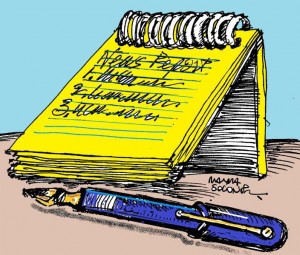 I watched the Dick Cavett Show and hung out with old high school buddies, who were also home for vacation. One bastard was applying to medical school. Another was studying for the CPA exam. One was a cub reporter.
I watched the Dick Cavett Show and hung out with old high school buddies, who were also home for vacation. One bastard was applying to medical school. Another was studying for the CPA exam. One was a cub reporter.
In Ann Arbor, my college friends were mostly still listening to the MC5 soundtrack: “You must choose, brothers and sisters, if you want to be part of the problem or part of the solution!”
I didn’t want to be part of the problem or the solution. My worst hometown scenario: a high school acquaintance was studying nursing home administration. How did he come up with that one? He didn’t. His mother did.
I gave my parents tsuris. College was nonsense, I said. And I quit.
I wound up in front of the draft board. The whole nine yards: bend over, touch your toes, spread your cheeks. I had a low number (42) in the draft lottery.
At the Selective Service office, I pondered the mechanical aptitude exam, which had drawings of carburetors and brake shoes. This test pretty much stumped me. Some of the other test-takers loved it. The test-takers were from my neighborhood. (The draft board went by neighborhoods.) Finally, a test about GTOs!
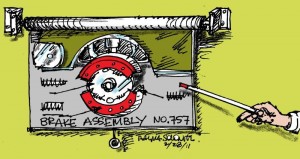
I handed the draft board doctor a list of my allergy medications and shots, and got out.
My parents didn’t go AWOL on me. They could have. My dad was bemused by my work boots and jeans jacket, but he didn’t go Archie Bunker on me. My dad took his marching orders from columnist Walter Lippmann, who called Vietnam a “quagmire.”
My parents waited. My mother insisted I was still a good boy. She had been saying that since I was in kindergarten.
I graduated college in due time. And I eventually went to the West Side — a lot. You’re a good boy. I can still hear my mother saying that.
—
Please see the next post too. It’s new.
March 9, 2011 3 Comments
LOYAL TO MY AXE
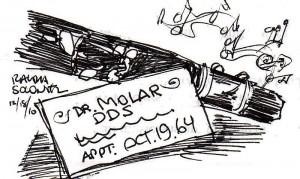
I’m loyal to my clarinet. A reminder card in the case tells me I have an orthodontist appointment on Oct. 19, 1964.
Many people in Cleveland are loyal to axes and other old things: sports teams, neighborhoods (East Side or West Side), mustards (Bertman Ball Park or Stadium), delis (Jack’s or Corky & Lenny’s).
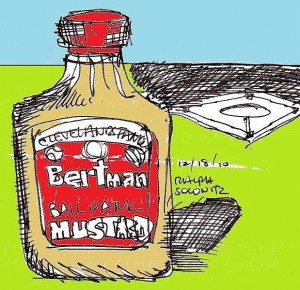 The most loyal Clevelanders are often those who have left town.
The most loyal Clevelanders are often those who have left town.
I tried to leave. My father kept hocking me to move to California. I visited California several times. I hitchhiked to San Francisco and bought a yarmulke at a Judaica store on Gerry Street and went up and down the  coast. I didn’t get any reaction to the yarmulke until I hit the Chabad House at UCLA: Oy hey!
coast. I didn’t get any reaction to the yarmulke until I hit the Chabad House at UCLA: Oy hey!
***
Yiddishe Cup has several lifelong Clevelanders in the band. Alan Douglass, our keyboard player, is from Mayfield Spillage (Mayfield Village). Irwin Weinberger, our singer, is from Pukelid (Euclid). I’m from South Useless (South Euclid).
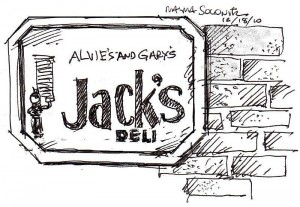 “We’re Yiddishe Cup from Cleveland! We’ve had a great time being part of this simcha!” No lie, because a) we enjoy playing simchas and b) we’re definitely Clevelanders.*
“We’re Yiddishe Cup from Cleveland! We’ve had a great time being part of this simcha!” No lie, because a) we enjoy playing simchas and b) we’re definitely Clevelanders.*
—
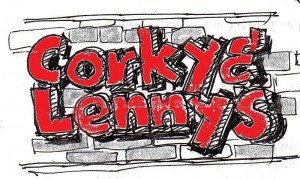 *A half truth. Half the band is from out of town. Trombonist Steve Ostrow is from San Diego. Drummer Don Friedman is from Erie, Pennsylvania. Daniel Ducoff, our dance leader, is from San Francisco.
*A half truth. Half the band is from out of town. Trombonist Steve Ostrow is from San Diego. Drummer Don Friedman is from Erie, Pennsylvania. Daniel Ducoff, our dance leader, is from San Francisco.
P.S. Daniel tried to convince the San Francisco Jewish newspaper that Cleveland is cooler than San Francisco. (Read that interview here.)
February 25, 2011 No Comments
A.B.E. (ALL BUT EAGLE)
The most Norman Rockwellian thing I ever did was go to Boy Scout meetings in the basement of the Methodist church in South Euclid, Ohio.
I wonder if Boys’ Life magazine is still around. [Yes, it is.]
I sold seeds for the Lancaster Seed Co., which advertised in Boys’ Life. I sent away for stamps on approval.
Be prepared . . .
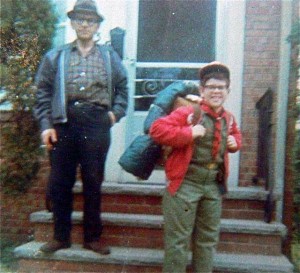
Irwin Weinberger and his father, Herman (with cigarette), 1966
For surprises. Like the lead singer in Yiddishe Cup, Irwin Weinberger, is A.B.E. (All But Eagle). He tried to get an Eagle Scout badge as an adult, but the national office wouldn’t give the badge to an old guy. I’ve seen Irwin swim. He can do it now, Headquarters!
If the Scouts would give Irwin the badge, he would donate $1,000, minimum. (My guess.)
Did Irwin ever get the Ner Tamid religious service medal? [Yes.]
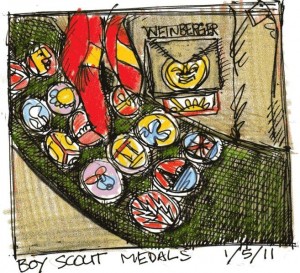 The Boy Scouts religious service medals — like the Ner Tamid emblem — were attractive because they were real medals. For the Episcopalians and other Christians, the medals looked like British flags, with lots of crosses. Very cool. The Ner Tamid medal was an eternal light. Not as cool, but cool.
The Boy Scouts religious service medals — like the Ner Tamid emblem — were attractive because they were real medals. For the Episcopalians and other Christians, the medals looked like British flags, with lots of crosses. Very cool. The Ner Tamid medal was an eternal light. Not as cool, but cool. 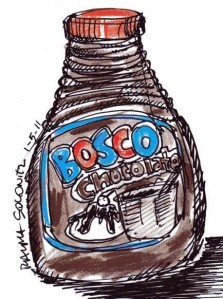
Boys’ Life. I miss that mag. Then again I miss a lot of things, and Boys’ Life is way down the list.
Just above Bosco.
—
[Please scroll down for one more photo.]
————
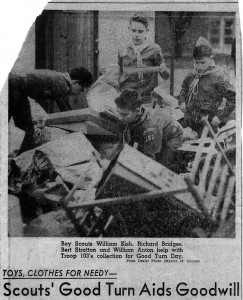 Cleveland Plain Dealer, Dec. 3, 1961. My wife identified me on her third try.
Cleveland Plain Dealer, Dec. 3, 1961. My wife identified me on her third try.
—
[And here’s one more Ralph Solonitz illustration.]
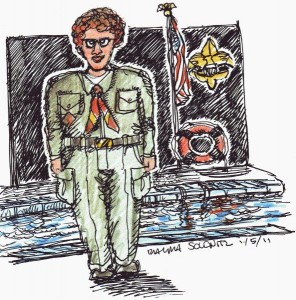
I'm standing at attention right here till I get my Eagle badge!
—
Please see the next post too. It’s new.
February 23, 2011 12 Comments
BASEMENT GUY
A Yiddishe Cup fan said she lived in the house I had grown up in. I asked her if the basement was still wood veneer paneling.
Yes, she said.
My teenage sister had lobbied for that basement veneer. It made for better make-out parties. Basements were where the action was. It was where you got all kinds of work done.
How do people in sunny climates get any work done?
My friend and neighbor John Cermak lived in his basement his entire adult life. He installed a pool table, gun rack and shower.
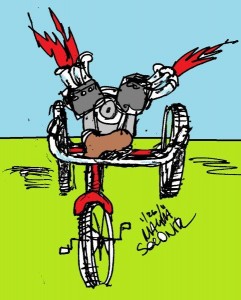 When I became a landlord, I often called John for advice on boilers, blown fuses and backhoes. When he was about 8 years old, he mounted a lawnmower engine on a tricycle. He was my guru of the physical world. John was also good at academics; he was interested in everything from English literature to Saab car engines. He graduated St. Ignatius High and John Carroll University.
When I became a landlord, I often called John for advice on boilers, blown fuses and backhoes. When he was about 8 years old, he mounted a lawnmower engine on a tricycle. He was my guru of the physical world. John was also good at academics; he was interested in everything from English literature to Saab car engines. He graduated St. Ignatius High and John Carroll University.
John died at 41 from complications of mental illness and alcoholism. He could put away a case of Wiedemann’s in a single weekend. Or was it in a single day?
I still often think of calling John. For instance, the electric company called and said, “The voltage at the cap is good.” It was? If the voltage was good, why didn’t we have any power in four suites? The electric guy said, “The inside line, outside, is yours.”
John, you there?
January 28, 2011 No Comments

